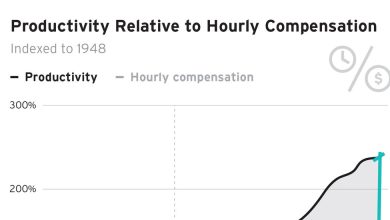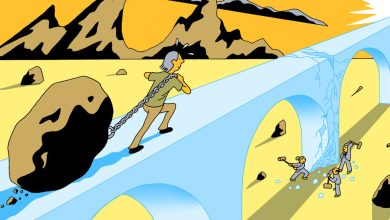The Last Major Airline Deal?


About to get rebranded?Credit…Chris O’Meara/Associated Press
Airlines and antitrust
A fight is brewing over the future of the budget carrier Spirit Airlines that could give rise to a credible competitor to the industry’s “Big Four.”
In February, Frontier Airlines and Spirit announced plans to merge, promising to create a national budget airline that would help keep fares low. But this week, JetBlue Airways swooped in with a $3.6 billion all-cash bid for Spirit, a significantly higher offer than Frontier’s cash-and-stock deal. Late yesterday, Spirit said it would start talks with JetBlue to assess the merits of its bid.
Either offer will attract close regulatory scrutiny. They will also test the way that trustbusters review deals, as officials increasingly consider more than just market share, The Times’s Niraj Chokshi and DealBook’s Lauren Hirsch report.
The deal is the latest example of a bidding war in which antitrust scrutiny plays a leading role. Frontier’s bid for Spirit is lower than JetBlue’s, but Frontier argues that its deal offers more regulatory certainty, given that JetBlue is bigger and focuses on higher-priced fares. This is a sign of the times — see the fight over the Kansas City Southern railroad — as policymakers focus on the impact of deals on economic inequality, inflation and wages (more on that below).
“Both deals present a new challenge to antitrust agencies,” said Paul Denis, who represented US Airways in its merger with American Airlines, and previously worked at the Justice Department. A review of any deal involving Spirit would explore whether there is a “unique rivalry” among lower-cost carriers. After waves of consolidation among larger legacy airlines, American, Delta, United and Southwest have a combined 66 percent share of the U.S. market. Frontier-Spirit would control 8 percent, while JetBlue-Spirit would account for 10 percent.
Breaking down the two deals:
-
Combining with Frontier would create a larger national budget airline that could pressure bigger carriers to drop fares in more cities. But it would eliminate competition on popular routes, potentially hurting cost-conscious travelers. Frontier and Spirit have also been criticized for poor customer service, and critics of the deal warn that service could worsen post-merger.
-
A tie-up with JetBlue, which already competes with the biggest carriers in cities like New York and Boston, could create a stronger challenger bolstered by Spirit’s planes, airport slots and staff. Spirit’s customer service may improve, but its ultracheap fares could rise. And an antitrust review may be complicated by the fact that the Justice Department is already trying to nix a partnership between JetBlue and American in the Northeast.
HERE’S WHAT’S HAPPENING
A new face on the Supreme Court. Judge Ketanji Brown Jackson was confirmed on a 53-to-47 vote in the Senate. This summer, she will become the first Black woman to serve as a justice in the 233-year history of the high court, but the basic dynamic of the nine-member court will remain unchanged, dominated by six Republican appointees.
Tesla will begin production of its Cybertruck next year. ElonMusk unveiled the electric truck, originally slated for a 2021 rollout, for the second time at an event in Texas. In other Musk news, Twitter’s C.E.O. Parag Agrawal will host a town hall for employees with Musk, whose invitation to join the social media company’s board has reportedly generated unease.
Walmart raises truckers’ starting salary to as much as $110,000 a year. The pay bump, from $87,500, comes as companies deal with a shortage of long-haul truckers. Relatedly, the video game developer Activision agreed to convert 1,100 of its temporary employees to full-time status, a sign that workers might be gaining more bargaining power.
Former President Donald Trump faces a contempt charge and continued investigation in New York. Letitia James, the New York State attorney general, asked a judge to hold Trump in contempt for failing to turn over documents in the state’s civil investigation into his businesses. And Alvin Bragg, the Manhattan D.A., spoke publicly for the first time since taking office about his criminal investigation into Trump.
Energy funds are the market’s top performers this year. The stock funds were up 32 percent in the first three months of 2022, far outpacing the overall stock market, which fell nearly 5 percent in the first quarter.
A new Hollywood giant starts rolling
As early as this afternoon, Netflix, Disney, Amazon and Apple will face a big new competitor in streaming, with the mega-merger of Discovery and WarnerMedia expected to close, forming a new company called Warner Bros. Discovery. The combined group will have roughly 40,000 employees and nearly $50 billion in annual revenue.
The blockbuster deal brings together a major movie studio, responsible for franchises like Harry Potter and Batman, with TV production units, including TLC, HGTV, and Food Network, and the news network CNN. Over time, the companies’ streaming services, HBO Max and Discovery+, are expected to combine into one platform.
The merger presents significant new challenges for David Zaslav, who has been leading Discovery for 15 years and will be the C.E.O. of Warner Bros. Discovery, and his new leadership team:
-
The merged company will assume $55 billion in debt and is under pressure to pay down quickly.
-
It has pledged to find $3 billion in savings, particularly in overlapping business functions.
-
The cost cuts could come from layoffs. The merger has already resulted in a number of high-level exits, including Jason Kilar, the head of WarnerMedia, and Ann Sarnoff, who ran Warner Bros.
“The sociopathic grandpa from Omaha. He’s enemy No. 1.”
— Peter Thiel, the billionaire investor, on Berkshire Hathaway’s Warren Buffett. Thiel was speaking at a Bitcoin conference in Miami, where he said that Buffett, JPMorgan’s Jamie Dimon and BlackRock’s Larry Fink were among the key figures holding back cryptocurrencies.
Who broke the wheat market?
In early March, the market for wheat stopped working. Trading was halted, restarted and halted again. Prices for a key futures contract were essentially frozen because there were no buyers or sellers. It went on for days.
The market is functioning again, but wheat traders are still trying to piece together what happened, The Times’s Emily Flitter reports. Here are some of the theories:
-
It was the “wheat whale.” A trader took a large position in wheat and got stuck (or, uh, beached). All eyes are on an exchange-traded fund, the Teucrium Wheat Fund. In early March, investors piled into the E.T.F., guessing that Russia’s invasion of Ukraine would drive up wheat prices, since both countries are large wheat producers. Some speculate that the fund, which buys only futures contracts, couldn’t cope with the volume and blew up the contract for May delivery (it traded “limit up” for several days in a row).
-
The wheat market went meme. On March 7, a user on Reddit observed that the price of wheat was soaring: “I wouldn’t be surprised if we hit at least $20,” wrote a Reddit user with the handle “quarantrader.” A number of wheat traders are pointing to that message as the start of the turbulence: It happened with the so-called meme stocks GameStop and AMC, so why not wheat?
-
Shorts got squeezed. Andrey Sizov, a grain analyst based in Russia, said hedge funds that placed bets on wheat prices falling were caught off-guard by the war. As they quickly covered their positions, the market ran out of sellers. But unlike in the nickel market, which also froze in the early days of the war, no single short-seller has emerged with big losses.
Are monopolies making inflation worse?
Many C.E.O.s cite rising energy costs, snarled supply chains and other factors for stubbornly high inflation. But some in progressive policymaking circles say there is another reason prices are rising: profiteering by dominant firms.
Short-term factors like conflict and Covid give executives cover for raising prices, but a longer-term problem is that it is “nearly impossible” to prove price-fixing because of weakness in the law, said Krista Brown of the American Economic Liberties Project, an antitrust advocacy group. The group is proposing model legislation to address what it calls “collusive pricing behavior.” DealBook got a first look at it.
No explicit agreement is needed to create a “shared monopoly,” the A.E.L.P. said. Executives at dominant companies in highly concentrated industries talk up their pricing power on earnings calls, essentially inviting other companies to collude, Brown said. Yet proving price-fixing under current law is tricky, as the economist Hal Singer testified at a congressional hearing this week. A.E.L.P. believes five legal “tweaks” could address this:
-
Shifting the burden of proof to defendants to show that they are not colluding, instead of forcing plaintiffs to prove that they are.
-
Making it harder to dismiss cases based on circumstantial evidence.
-
Barring people convicted of price-fixing violations from working in the industry where they broke the law.
-
Preventing forced arbitration rather than litigation.
-
Broadening an antitrust whistle-blower program.
Could this idea gain momentum? The Biden administration has talked about antitrust enforcement as a means to combat rising inflation. The U.S. Chamber of Commerce said this is an “excuse to overregulate,” and a recent survey of economists found that most disagreed that corporate concentration is driving up prices.
THE SPEED READ
Russia-Ukraine war
-
A Russian strike on a crowded train station in eastern Ukraine left at least 39 people dead and nearly 90 wounded, leading to calls for more international sanctions on Moscow. (NYT)
-
The U.S. stripped Russia of preferential trade status and cut off the supply of parts and maintenance for three Russian airlines. The E.U. approved a ban on Russian coal imports — starting in August. (NYT, Reuters)
-
A blueprint for how to rebuild Ukraine, by an all-star group of economists. (VoxEU)
-
Here’s the latest list of what companies are doing in Russia, from quitting entirely to staying the course. (Times Opinion)
-
If a barrel of oil has just under 50 percent Russian crude, some oil companies say it doesn’t technically count as of Russian origin. (Bloomberg Opinion)
Deals
-
SPAC deal cancellations are up sixfold this year, as investors sour on blank-check transactions. (FT)
-
A $4.2 billion deal between Frontline and Euronav would create one of the world’s largest oil tanker owners. (WSJ)
-
Pfizer will buy drugmaker ReViral for up to $525 million, as it expands its work on infectious diseases. (WSJ)
Policy
-
Amazon intends to appeal the union victory last week at a warehouse in Staten Island. (WSJ)
-
The U.S. is years away from minting a digital dollar, Treasury Secretary Janet Yellen said. (WSJ)
Best of the rest
-
China’s pandemic lockdowns are wreaking fresh havoc on global supply chains. (NYT)
-
Twitter will test an “unmentioning” feature that could help curb abuse and harassment on the platform. (Protocol)
-
The percentage of U.S. workers testing positive for drugs has hit a 20-year high. (WSJ)
-
As the global chip shortage continues, The Times takes an inside look at how semiconductors are made. (NYT)
-
“9 Ways to Imagine Jeff Bezos’ Wealth” (NYT)
We’d like your feedback! Please email thoughts and suggestions to [email protected].





